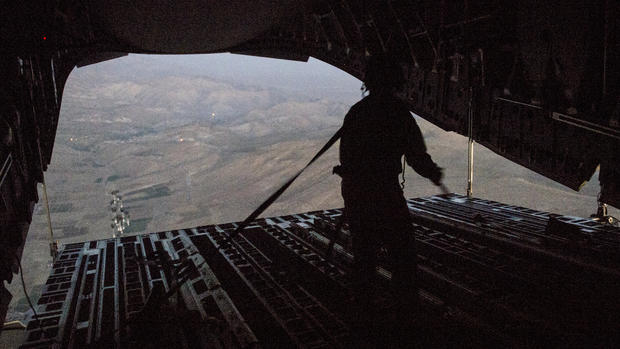Obama: "New Iraqi leadership has a difficult task"
President Obama said Monday that the incoming Iraqi leadership "has a difficult task" ahead as it works to form a new government and battle the Islamic State of Iraq and Syria (ISIS), but pledged his support as long as the new government works to govern inclusively.
"This new Iraqi leadership has a difficult task. It has to regain the confidence of its citizens by governing inclusively, and by taking steps to demonstrate its resolve," Mr. Obama said Monday from Martha's Vineyard, where he is on his annual family vacation. "These have been difficult days in Iraq, a country that's faced so many challenges in its recent history, and I'm sure that there will be difficult days ahead but just as the United States will remain vigilant against the threat posted to our people by [ISIS], we stand ready to partner with Iraq in its fight against these terrorist forces."
"Without question that effort will be advanced if Iraqis continue to build on today's progress and come together to support a new and inclusive government," Mr. Obama said.
Prime Minister Nouri al-Maliki has steadfastly refused to step down from his post. On Monday, Iraq's new president nominated the deputy parliament speaker, Haider al-Ibadi, to form a new government within 30 days. Al-Ibadi was selected by a coalition of Shiite political parties.
State Department Spokeswoman Marie Harf said that Maliki is legally still the prime minister, and there is still a process that must unfold before he is out of power.
"This is an important step in the process, one that we absolutely welcome," Harf said.
Vice President Joe Biden called al-Abadi Monday to offer congratulations from himself and Mr. Obama. Al-Abadi "expressed his intent to move expeditiously to form a broad-based, inclusive government capable of countering the threat of [ISIS], and building a better future for Iraqis from all communities," according to the White House.
Mr. Obama reiterated again that he sees "no American military solution" to the crisis in Iraq, and that, "the only lasting solution is for Iraqis to come together and form an inclusive government."
Lt. Gen. William Mayville the director of operations for the Joint Chiefs of Staff, said Monday that the U.S. is focused on its mission to protect assets and provide aid to Iraqis targeted by Islamic militants and has no plans to expand the air campaign.
"What we are doing right now is to protect the U.S. facilities and American citizens at those facilities, to protect U.S. aircraft that are supporting humanitarian assistance in and around Mount Sinjar and to target those [ISIS] positions that are laying siege to Mount Sinjar. There are no plans to expand the current air campaign beyond the current self-defense activities," Mayville told reporters Monday.
He said that the U.S. airstrikes have had a "very temporary effect" and may have "blunted" the ability of ISIS to move east toward Erbil, the capital of the Kurdish region, he did not predict they will have a lasting effect on the militants.
"I in no way want to suggest that we have effectively contained or that we are somehow breaking the momentum of the threat posed" by ISIS, he said. The U.S. remains "very concerned" about the group's military capabilities, he added.
So far the U.S. has conducted 15 airstrikes in Iraq and flown 14 successful humanitarian aid missions with American and British air crews. They have delivered more than 310 bundles of food, water and medical supplies containing more than 16,000 gallons of water and 75,000 meals to civilians threatened by ISIS, including a religious minority sect known as the Yazidi. Thousands are trapped on Mount Sinjar, threatened with death if they descend, and hundreds more are believed to have been executed or taken as slaves by ISIS.
Mr. Obama also said that U.S. aircraft "remain positioned to strike any terrorist forces around the mountain who threaten the safety of these families."
Even though the U.S. has resisted entanglement in the current Iraq conflict, CBS News Intelligence Analyst Michael Morell, the former deputy director of the Central Intelligence Agency, said Monday that the U.S. will have to help Kurdish and Iraqi forces in order to completely wipe out ISIS.
"It's going to require us with our capabilities to take out the leadership of the group while the Iraqi army and the Kurdish army, the Peshmerga, fights on the ground against these guys," Morell said on "CBS This Morning" Monday.
Responding to reports that the U.S. has begun providing weapons directly to Kurdish forces, Mayville said that all resupply is being done by the Iraqi government in a continuation of current policy. But, he said, the Peshmerga's need for small arms and ammunition is "pretty substantial" and the U.S. is "looking at plans at how we can expand that support."
CBS News National Security Correspondent David Martin reports that the CIA has been resupplying Kurdish forces for at least the past week in addition to regular Iraqi efforts. But he said the Defense Department will get involved next week to supply a huge request made by the Kurds, including hundreds of thousands of rounds for machine guns and assault rifles, thousands of rounds of mortar ammunition for all sizes of mortars and 20,000 rocket propelled grenade launchers. It will take several days to round up the supplies before delivery begins.
